Organize Your College-Bound Student for Grownup Life: Part 2

From living with strangers to not having parents and teachers overseeing study habits and self-care, college is a melange of delightful freedom and terrifying responsibility.
Last week, in Organize Your College-Bound Student for Grown-Up Life: Part 1, we reviewed the serious side of what to make sure your kids have and know before heading off to college. We covered making sure they know their Social Security number by heart, having a a handle on important contacts and key medical information, and getting registered to vote and knowing how to exercise their rights to vote.
We looked at legal documents, like Power of Attorney for Healthcare (AKA: healthcare proxy) documents, FERPA waivers, and HIPAA releases, which in combination ensure that a college student has someone they trust looped into their medical situations and able to make medical decisions if they are unable to.
We also started developing punch lists of adulting information and skills, starting with the essentials related to financials and insurance.
And, because people pay more attention to serious things when they can take a moment to breathe, I included a few Chip Leighton “texts from college students” videos from The Leighton Show. More are peppered in this post. (As with last week, click near the lower left portion of the video to un-mute.)
@the_leighton_show Posting one more for all the parents dropping kids off at college #teenagers #college #freshmanyear #text #funny ♬ original sound – The Leighton Show
HOW TO COMMUNICATE BEYOND TEXTS AND EMOJIS
Recently, I was surprised to find that most younger people don’t ring doorbells or knock; they text when they pull up outside. (Honestly, to keep from waking babies or making dogs go nuts, this is pretty smart!)
Gen Z students have often managed to get through life without learning some adulting skills with regard to communication and interaction. Before dropping them off on campus, make sure your kids have these skills.
- How to write, address, and mail a letter. Somewhere around fourth grade, they taught us how to write a “friendly” letter and a business letter, including the entire format of date, “inside address,” salutation, body, and appropriate closing. They also taught us how to address an envelope, where to put the return address, and where to place the stamp. Apparently, this is not taught anymore, as evidence by various Reddit threads, including the one below.
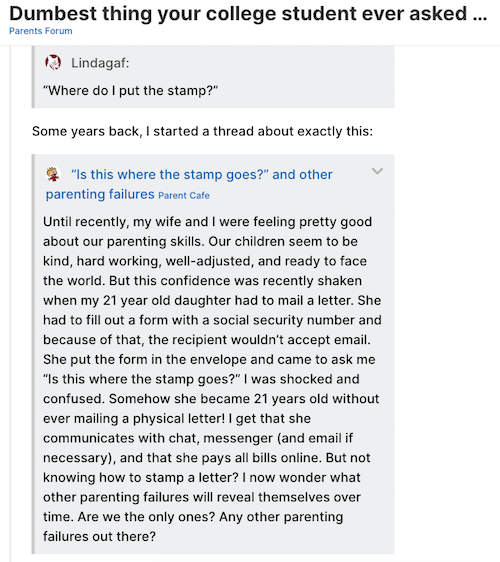
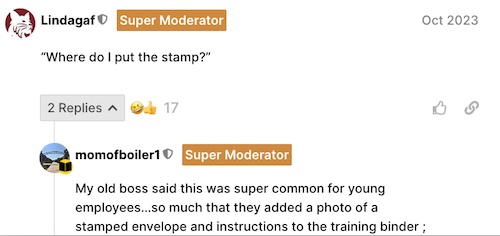
- How to sign their name in cursive. Some elementary schools stopped teaching cursive in 2010, though there now seems to be a backlash against the removal. Whether or not your student knows how to write (even remotely legibly) in cursive, make sure they understand how to sign their legal name.
- How to write a grown-up, professional email. Use a clear subject line that indicates the purpose of the message. Write in full, grammatically-correct sentences. Spell check. Don’t use emoji or slang. (Seriously, no cap.) Except in a rare case when asked to do so, don’t address female professors as “Mrs.” That’s a social honorific, and this isn’t kindergarten. They’re either Professor or Doctor or (if TAs or adjuncts) Ms. (unless they ask you to use their first name). Don’t address professors of any gender as “Bro” or “Dude.” (This goes for verbal communication, too!)
- How to schedule an appointment (and how to reschedule or cancel one) — Your kid knows how to log into a web site and pick a time slot, but Gen Z is particularly phone-averse. Role play with them how to make a call to request an appointment with a doctor or dentist, to get their hair cut, to have their car evaluated or repaired, etc. Teach them how to summarize why they’re calling (whether to a gatekeeper or for voicemail).
- How to leave voicemail — Guide them not to say, “Um, so this is Joe. I need you to call me back” without any hint of why. Young people are often nervous about calling strangers, so they should plan the message, mentally or even in writing. Encourage them to think about why they’re calling — and what result (information? permission? assistance?) they need.
This is good advice for grownups, too, especially those suffer from social anxiety. Practice eases the process. State your name, phone number, and reason for calling so the recipient can do their legwork and get back to you at their convenience without wasting their time (or yours on a cycle of call tag).
- How to write a thank you note — In case it’s been a while since you impressed upon your child the importance (and power) of this habit, share a classic Paper Doll post, Gratitude, Mr. Rogers, and How To Organize a Thank You Note and remind them, once again, that grandparents are more likely to send gifts (money? Apple gift cards? freshly baked cookies?) when thanked for their actions.
- How to apologize authentically and effectively — Whether your student eats her roommate’s last yogurt or commits a more unpardonable act, don’t let kids go off to college without this essential life skill. Make sure they understand that “I’m sorry you got mad” is not an apology.
There’s an easy formula:
-
- Use the words, “I’m sorry” or “I apologize.”
- Take responsibility and state what you actually did wrong.
- Illustrate that you understood the impact of your actions on the other individual.
- Explain how you’ll ensure it won’t happen again, or show how you’ll make reparations.
STAY SAFE, ON CAMPUS AND OFF
There will likely be a safety workshop during orientation week. Encourage your student to attend and to understand what kind of built-in infrastructure the campus has for safety.
Be Safe When Walking Around
When I attended college, we had a Blue Light service, poles throughout campus with blue lights at the top and telephones connected to Campus Safety. You could make a direct call (without a coin) or just hit the handsets as you ran from a horror movie monster (let’s ignore the more serious alternative) and campus safety peer volunteers and personnel would come out in force. There were also free “blue light buses” on campus to ferry people home safely at night. I was delighted to find out that this system is still in place, with some modern tech additions.
Nowadays, most campuses have high-end safety systems and apps. Still, encourage students to program the campus security number into their phones and know how to request an official campus peer escort. Other advice to impart:
- Don’t walk alone, especially at night. Take heavily-trafficked routes with good lighting.
- Let your roommate or BFF know where you are headed, and program your phone to share your real-time location (one time or ongoing) and ETA:
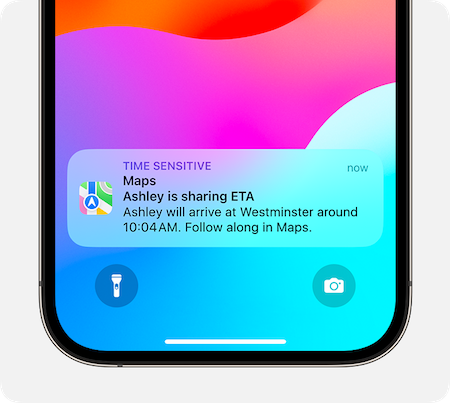
- You’re probably not going to convince your college kid to never ride with strangers, but you can fund an Uber or Lyft account to make it easier to get home if they’ve gone to a concert or club off campus. You may also want to discuss GrownandFlown.com’s The 7 Ride Share Safety Tips Every Teen Needs to Know.
Be Safe in Your Dorm and When Out and About
- Lock your room when not in it (so you don’t walk in to any surprises), or when you are, but lots of others aren’t around.
- Close and lock your windows when you are sleeping or not in your dorm, especially if you’re on the ground floor.
- Program campus housing numbers into phones.You might be locked out of the dorm without keys or key cards or wallet, but nobody goes anywhere without their phones anymore.
Hopefully, you’ve had lots of conversations with your teen about how to have situational awareness when walking around (or studying, especially alone), how to be safe at parties, and how to figure out whom to trust. These kinds of skills can take many years to develop, but open conversations are the beginning.
This is an organizing blog, not a parenting blog, but I fervently hope that just as many parents will teach their sons the importance of not victimizing as they teach their daughters how not to be victims.
For more in-depth advice, You may also want to share:
- How to Stay Safe on a College Campus (US News & World Report)
- 9 Ways to Stay Safe on Your College Campus (Safewise)
- 10 Campus Safety Strategies for College Students (RAINN)
- Campus Safety Guide (Best Colleges)
Be Safe During Emergencies
Personal safety doesn’t just include watching out for bad guys. Your kids had fire drills in school, but they’re used to following an grownups instructions. Now that they’re the grownups, make sure they know:
- How and when to call 911 vs. the police non-emergency line vs. the campus health center vs. the resident hall director).
- When to go to the ER vs. urgent care, or the health center, or a family doctor (or to call the health insurance Ask-A-Nurse line…or Dr. Mom)
- How to use a fire extinguisher. When I visited my old campus for my reunion in June, I saw that fire extinguishers had changed; they were neither the massively heavy ones I recalled from my youth nor the can-of-whipped-cream style I have at home. Have them read the instructions.
- Pay attention to the exits when entering classroom or building, and know the safe exit path for the dorm.
While it’s designed primarily for families, your student might find Paper Doll Organizes You To Prepare for an Emergency to be a useful starting point.
Be Safe When Interacting with the Police
If you or anyone in your family or close circle is Black (or you’ve ever watched a Shonda Rhimes show), you almost certainly know about The Talk and have had it, and multiple iterations of it, before sending a child to college.
However, if you are not a member of a visible minority, your have probably been privileged to not have to think about this. Role-model and practice so your college-bound student knows what to do if they are stopped while driving, riding, or walking — or if the police come to their dorms to make inquiries — or if they participate in a campus protest.
If you watch police procedurals, you’re probably familiar with the concept of swatting, the practice of making a prank call to emergency services in order to get armed police officers dispatched to someone’s address. It happens to congressional representatives and judges, but it also happens to random people, including college students. It apparently started with online gamers being targeted by others playing the game.
Almost nobody gets through life without interacting with police officers, and whether it’s municipal police or campus security, student needs a skill set for handling potentially scary interactions.
Again, this post is about organizing adulting skill sets. Beyond, “stay calm and don’t escalate,” I won’t advise you regarding what you should tell your children, but encourage you to talk to them about how to do it safely and with some starting points:
- ACLU’s Know Your Rights: Stopped By Police (ACLU)
- Dealing With Campus Police: Top 3 Legal FAQs For College Students (FindLaw)
- Black Parents Describe “The Talk” They Give to Their Children About Police (Vox)
HOW TO STAY HEALTHY AT COLLEGE
Nobody gets to college without having had a booboo or a cold or a stomach bug, but a lot of parents find that their newly independent children experience a sense of amnesia once any of these things happen at college. Use the following as prompts to make sure your kids are ready for dealing with the owies of adult life.
Be Prepared for Medical Ickiness
Everyone eventually gets the crud, and being away from home makes it worse. However, knowing how to handle the experience makes having the yuckies marginally better. Make sure students know:
- How to treat a sore throat, toothache, upset stomach (and related intestinal distresses) and minor viruses.
- How to recognize symptoms (like a high fever) requiring professional medical intervention.
- How the dosage on OTC and prescription medicine works. There’s a reason why it says “take no more than X in 24 hours” — because people thought X “in one day” meant they could have X at 11:45 p.m. and again at 12:15 a.m. Medication doesn’t follow a calendar.
- How to fill and refill a prescription — If you’ve always done it for them, your student may not know about prescription numbers or number of refills available.
- How to take maintenance medication or perform health activities without you having to remind them — You won’t be able to ask, “Did you take your ADHD meds today?” or “How many times did you check your blood glucose today?” Your student knows how to set an alarm on the phone, but walking them through how to label the alarms to make it clear which meds are for that specific alarm could help. Even “experienced” adults with established schedules forget to take meds when on vacation; college schedules are stress-inducing and can lead to forgetting, so help them help themselves.
- Where the nearest 24-hour pharmacy is, before they need it — At some point, your student will need Pepto or condoms or feminine sanitary products or a COVID test at 3 a.m. Being prepared is half the battle.
- How to do First Aid — Not everybody was a scout. I’m often shocked by people (OK, men. It’s always men) who don’t know how to properly clean a small wound, remove a splinter, or put on a bandage. You can’t anticipate everything — minor and major — need to know, so share the National Safety Council’s First Aid Video Library link. It’s impressive.
- How to fill out health insurance forms at the doctor’s office. — Seriously, your kid should know their blood type without having to call and ask you. (That’s why I told you last week to give them copies of their medical history information.)
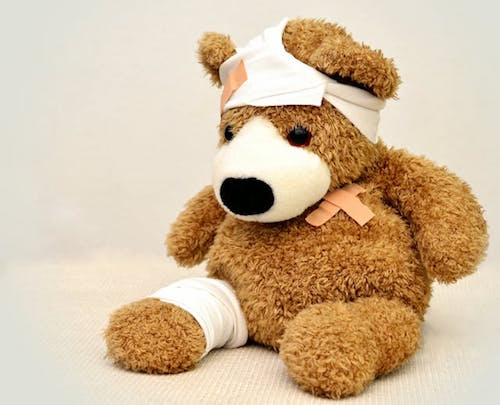
Booboo Bear Photo by Pixabay
How to Deal with College Life Ickiness
- How to safely drink/consume things you’d prefer they didn’t partake of at all.
- How to help a friend who has unwisely or unsafely imbibed or consumed something. This might range from treating hangovers to knowing how to use NARCAN to the calling 911!
- How basic hygiene works. Wash hands! — Feel like you shouldn’t have to explain this to an adult? Reread Organize Your Health: Parental Wisdom, Innovation, and the New Time Timer® Wash. Yes, it’s from the first year of COVID, but the unfathomable reminder that people forget to wash their hands is timeless.
- Wash water bottles. — We didn’t even have bottled water when I was in college. Now, Stanley cups (not the hockey kind) are everywhere. And no, just because there’s only water in it doesn’t mean it’s clean. Microbes are icky. (Secret cleaning trick? Denture tablets!)
How to Deal with Grown-Up Issues
I hope you and your student have the kind of relationship where you can discuss “adult” things without (too much) awkwardness. I was lucky that Paper Mommy always made a safe space to talk about difficult issues, but not everyone has that ability (or that parent).
You may have had that other version of “The Talk” with your student in adolescence, but whether you’re dealing with reproductive care or mental health or anything sensitive, at the very least encourage your college-bound student to talk. Say that you hope they’ll talk to you, but even if not, that there are many safe places (starting with the campus health center) to find accurate information and supportive care. Some of the issues they may need to contend with include:
- Safe sex
- How to use contraception properly
- How to say no, at any point in the process, and maintain healthy boundaries
- How to be secure consent and step back if there is no consent
- Mental health
- How to recognize the signs of depression or anxiety (or other mental health concerns) in themselves and their friends, including social isolation or an increase in risky behaviors, or changes in academic performance, mood, sleep or eating habits, or personal hygiene.
- Where to seek mental health help, on campus or virtually
- Self-care — Remind your beloved child of their options for caring for their mental health, including:
- taking breaks
- exercising
- getting out in nature
- talking to friends
- journaling
- calling home
- speaking with a therapist
- understanding that everyone has problems, they are manageable, and there is support available
For your purposes, peruse Empowering Wellness: Supporting Freshman Health and Well-Being from College Parents of America, and perhaps get your kid a copy of something like The Greatest College Health Guide You Never Knew You Needed: How to Manage Food, Booze, Stress, Sex, Sleep, and Exercise on Campus before they leave for campus.

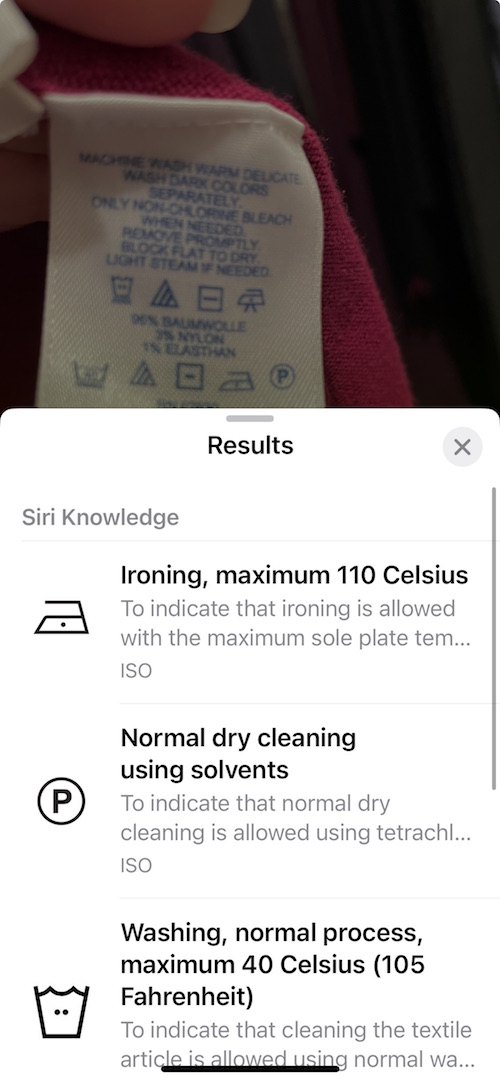




Reading through your list just brings back a lot of memories, but for myself and for my children. One girl came back to her dorm to find her roommate’s friend had vomited all over her bed. Another girl roomed with people who never washed anything. It was nasty.
Personally, my diet at school was awful. I ate everything wrong. BUT, I survived. As I’ve gotten older, I’ve become more nutrition conscious. I do think the current younger generation knows a lot more about food and health than I ever did. In general, this is good. Still, it makes me sad to hear young people talking about how they “shouldn’t” be eating a treat, or how it is going to make them fat. I think everyone needs to learn about healthy choices, and the concept of moderation!
My husband did go to the gym in the late 80s. He was a typical young man, obsessed with muscles and protein powder. He got upset to miss a day. Needless to say, this did not last. When “work” kicked in, there was no longer time to spend 2+ hours in the gym LOL. I will say that he got back into it during COVID, and has stuck with it ever since. So, there’s that!
Oy, Seana, I’m so sorry for that girl who returned to her room to find that “surprise.” And a professor friend of mine just told me a similar story about someone having never done laundry all semester who only sprayed her clothes with Febreze. Ick.
Even though, by college standards, Cornell had really good dining services, it was unlike the food I had at home. I lived on bagels as much as possible, though when I ate with my guy friends across from the engineering quad in a (now-defunct) dining hall under the law school, I always got the same thing: grilled cheese sandwich, hard boiled egg, dill pickle, Hawaiian kettle potato chips, a package of HoHos…and a diet Coke! 😉
You husband was a rarity, but I’m glad he’s found a healthy path for himself.
Thanks for reading!
Wow! So much good stuff and yes, I have had to deal with some of it.
My older son had an issue with his “legal” signature in High School. They wanted him to sign his name in cursive for his graduation. He refused saying that he never used a cursive signature and that his printed signature was his “legal” one. He actually won that argument.
I was working with a client not long ago who was writing a letter to an insurance company over a timely issue and I had to point out to him that he had not put a date on his letter.
And on a personal note – my first dormitory room had a window that opened to a porch roof – several times that window was used for letting in students that had missed curfew 🙂
Wow, I’m really surprised that your son won the argument. Was it just a school policy thing, or a legal document?
And yes, it just kills me that everyone isn’t taught skills like letter-writing, reconciling their accounts (as I wrote about last week) and basic financial and life skills anymore. I’ve never had to write a geometry proof or do calculus, but those skills elementary school skills come in handy!
Curfew! Hee! I’m sure you were very popular among your dorm friends!
Thank you for reading and sharing your stories!
This post brings back memories. I had to discuss how to live with a roommate that you don’t know, how to respect their space and personal habits and ask for the same in return.
Back in the day, my youngest son did not appreciate all the advice I offered so I stopped, then once he got to college he told me that he had to look up “how to write a check” on YouTube to pay his rent. The younger generation is lucky that they have resources for when questions arise.
I’m sure it’s a tricky balance. That last year before college is a melange of seeking independence and being scared of what’s coming, of wanting to shout, “Don’t treat me as if I don’t know everything/anything” and “Help, I just realize I don’t know everything/anything.”
Yes, thank goodness for YouTube! How did we survive before YouTube and Google and cell phones?
Thanks for reading!